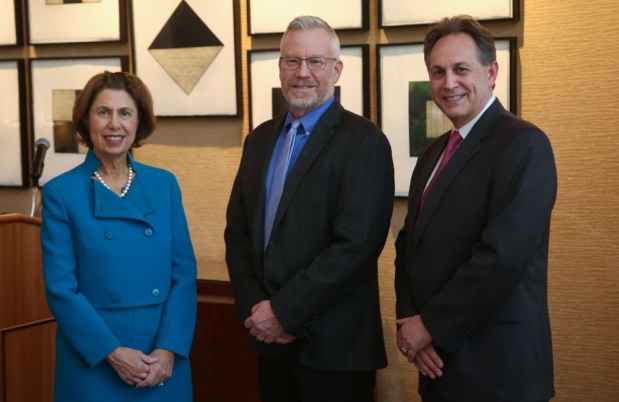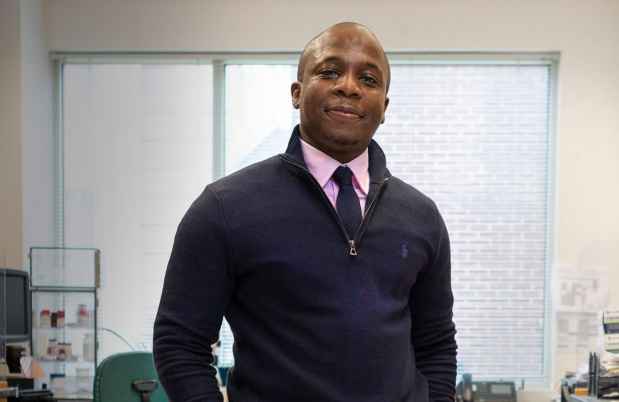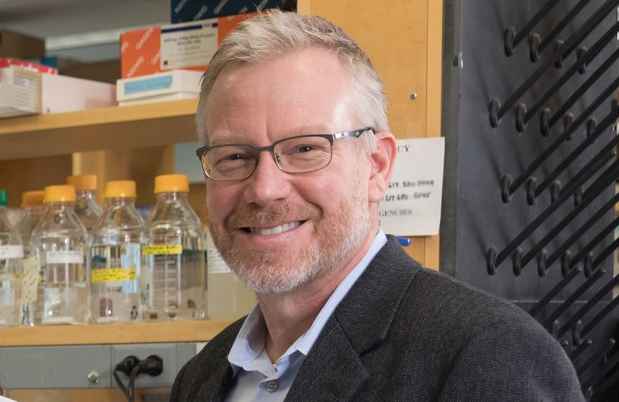Joseph T. Coyle, MD, director, Laboratory for Psychiatric and Molecular Neuroscience, one of the most renowned psychiatric neuroscientists in history, transitioned to emeritus status on October 30. Coyle’s groundbreaking research has illuminated some of the neurological mechanisms underlying Huntington’s disease, schizophrenia, and Alzheimer’s disease.
Coyle, who was one of the first psychiatrists to devote a career to neuroscience, traveled an inspired path. He majored in philosophy and French at Holy Cross College and spent his junior year at the Sorbonne. Despite his liberal arts background, his choice to pursue medicine was clear. “In those days, people didn’t spend a lot of time navel-gazing about what they were going to do with their lives when they graduated from college,” Coyle said. He hailed from a family of physicians that included his father, his maternal grandfather, two uncles, and two cousins.
While Coyle’s choice to study medicine was perhaps destined by family history, his decision to specialize in psychiatry was solidified by a chance encounter. He had taken a job as a psychiatric orderly at a community hospital the summer before he started at The Johns Hopkins University School of Medicine in 1965. A few weeks into the experience, the older brother of Coyle’s childhood best friend was admitted for his first psychotic episode of schizophrenia. As Coyle became incorporated into the other young man’s paranoid delusions, he felt terrible about what was happening and tried to help. He also felt engaged by the “ultimate epistemological conundrum the situation presented: what do we know, and how do we know it?”
Medical School and Beyond
Coyle was interested in Lacan, Freud, Sartre, and existential approaches to therapy. Owing to the rudimentary science background of a liberal arts major, he initially struggled in medical school. Soon, however, a new world opened.
“Science seemed to encompass memorizing obscure facts and putting them together in some sort of coherent pattern,” he said. “It was not necessarily pleasant.” At Johns Hopkins, though, Coyle discovered research, which he described as “exhilarating” and likened to “trying to figure out how God designed the world.”
In his sophomore year, he studied psychopharmacology in the class of the neuroscientist Solomon Snyder. Snyder gave fascinating lectures about emerging drugs in psychiatry, such as antidepressants and antipsychotics, at a time when the dominant theory in psychiatry was psychoanalysis.
“Sol spoke about psychedelic drugs, such as LSD, and how they worked by manipulating neurotransmitters in the brain that might tell us what causes disorders,” Coyle said. “It just blew me away.” Coyle spent his elective quarter research rotation in Snyder’s lab and eventually managed to spend a full year working with the renowned researcher.

The second year of medical school saw another important development in the young scientist’s life when a friend from the Sorbonne introduced him to Genevieve Sansoucy, a “really quite impressive” young woman who, at the time, was completing her master’s in clinical social work at Catholic University. Coyle and Sansoucy married in 1968 and would have three sons—Peter, Andrew, and David—within the next decade. Sansoucy, a psychotherapist who trained at the National Institute of Mental Health (NIMH), shared Coyle’s interest in psychopharmacology. Throughout her years of practice, she took on patients with serious mental illness who required medication management by psychiatrists and specialized in working on the psychological aspects of the condition or the impacts on the couple or family.
Becoming One of the Great Neuropsychiatrists
After an internship in pediatrics at Johns Hopkins Hospital, Coyle went on to a post-doctoral fellowship at the NIMH from 1970-1973 in the laboratory of Julius Axelrod, who won the Nobel Prize in 1970 for his work on the brain’s reuptake of catecholamine neurotransmitters. Coyle said, “It was a pretty exhilarating experience to be there at that time.”
He joined the Johns Hopkins faculty in 1975 and was named Distinguished Service Professor of Child Psychiatry in 1985. Under his guidance, the Hopkins’ Division of Child and Adolescent Psychiatry became one of the top programs in the country, transforming the field from a near-exclusive focus on psychoanalysis to a neuroscientifically grounded clinical one.
Coyle joined Harvard and McLean in 1991 after being recruited to serve as the chair of the academic Department of Psychiatry of Harvard Medical School—a role in which he served from 1991-2001. He has been a member, fellow, and officer of numerous prestigious scientific organizations; was the editor of JAMA Psychiatry for over a decade; and earned over 45 major awards during his career.
Mentoring the Next Generation of Scientists
Scott L. Rauch, MD, president and psychiatrist in chief of McLean Hospital praised Coyle for being “among the foremost psychiatric neuroscientists of all time.” Rauch added that while Coyle has held critical leadership roles at Harvard and McLean, “his contributions have equally entailed generative mentorship of countless students, faculty, and staff for decades.”
According to Coyle, one of the most enjoyable aspects of being an academic scientist has been the opportunity to work with people at earlier stages of their careers. Throughout his career, 15 students obtained PhDs and over 40 post-doctoral fellows completed their training in his laboratory. Of 45 undergraduates who worked as technicians in his lab, “44 went on to medical school or a PhD program in biological sciences, and one went off with a rock band to Japan,” Coyle said.
In reflecting on his years working with Coyle, Bill Carlezon, PhD, chief of the Jerry and Phyllis Rappaport Center of Excellence in Basic Neuroscience Research at McLean, spoke of the “leadership, support, and family-like atmosphere Dr. Coyle created in the workplace.”
Kerry J. Ressler, MD, PhD, chief scientific officer at McLean, added, “I’ve been a huge fan of Joseph Coyle’s work since I was a college student in the 1980s, and the work at McLean greatly inspired me to become a psychiatry physician-scientist. Dr. Coyle has inspired the field to make discoveries, drive mechanistic research, and change the face of psychiatric neuroscience in such a relatively short span of time.”
Paving the Way Toward Novel Treatments
Coyle said a major legacy of the last quarter century of his career is the work that he, his post-docs, and technicians have done with the neurotransmitter glutamate’s role in schizophrenia.
“The dominant biological theory about schizophrenia is that it is a problem with the neurotransmitter dopamine,” he said. “The focus has been exclusively on psychosis as the defining feature of schizophrenia. I’ve argued for almost a quarter century now that that’s an overly simplistic view.”
“For the past 60 years, antipsychotic drugs have treated psychosis, but they do not cure schizophrenia,” he added. By focusing on the glutamate neurotransmitter, he and others in the field have developed significant evidence that schizophrenia is a more fundamental disorder of neuronal processing in the brain’s cortex. Biotechnicians are responding to this line of reasoning and are conducting studies on drugs that would target activity in the cortex, providing hope that a more robust therapy for this serious psychiatric illness will become available.
More Time on the Shore
Although Coyle transitioned to emeritus status, he will continue to write research papers and serve on several international scientific boards.
He said he looks forward to spending more time with his family, which now includes two grandchildren. His wife Genevieve retired from her practice ten years ago, has since taken up sculling, and has become very active in politics. Coyle enjoys outdoor pursuits, such as bicycling, kayaking, and fishing. The couple will spend much of their time at their home on Maryland’s Eastern Shore—not too far from those pivotal early days at Johns Hopkins that led to a rich and full career.
Media Requests
Journalist or member of the media? We are available 24/7 for media requests.



